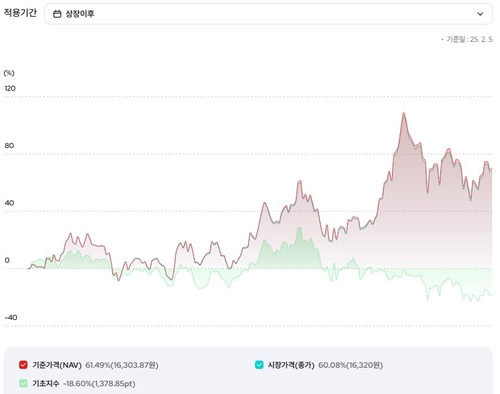(Seoul=Yonhap Infomax) Kyu Sun Lee = As the active exchange-traded fund (ETF) market grows and competition for excess returns among asset managers intensifies, TimePolio Asset Management's active ETFs are attracting market attention with their excellent long-term performance. Samsung Asset Management's KODEX K-New Renewable Energy Active ETF has shown the potential of active ETF management with outstanding performance, exceeding its benchmark index by over 86 percentage points (p).
According to the financial investment industry on the 6th, there are a total of 239 active ETFs listed in Korea. A significant number of newly listed ETFs last year were active, with active ETFs' net assets accounting for 33.9% of the entire ETF market. Particularly, since the launch of stock-type active ETFs was allowed in 2020, the number of stock-type active ETFs has been rapidly increasing.
Unlike passive ETFs that simply track the benchmark index, active ETFs actively adjust their portfolios at the fund manager's discretion to pursue higher returns than the benchmark index. They can follow about 70% of the benchmark index and freely compose the remaining 30% of the portfolio to seek excess returns (alpha). The fund manager's capabilities and market prediction skills play a crucial role, and these ETFs are considered particularly useful investment tools in markets with high volatility or sideways movements.
Yonhap Infomax analyzed the performance of stock-type active ETFs from major domestic asset managers since their listing. The results showed that TimePolio Asset Management's ETFs achieved the highest ratio of excess performance compared to the benchmark index at 88.9% (8 out of 9).
Among TimePolio Asset Management's ETFs, TIMEFOLIO K-Culture Active ETF recorded the best performance with a 41.62%p higher return than its benchmark index since listing. This ETF uses the FnGuide K-Culture index as its benchmark and mainly includes entertainment stocks such as JYP Ent., HYBE, and SM Entertainment. The TIMEFOLIO Global Anti-Aging Bio Active ETF underperformed its benchmark index, but the excess loss was not significant at 3.61%p.
Samsung Asset Management's KODEX ETFs also recorded a high excess performance ratio of 88.9% (8 out of 9). Notably, KODEX K-New Renewable Energy Active ETF's market price since listing was 86.69%p higher than its benchmark index (FnGuide K-New Renewable Energy Plus Index), making it a successful case of active ETF management. This ETF mainly includes transformer-related stocks such as HD Hyundai Electric and LS ELECTRIC, achieving a high return of 68.61% even as the benchmark index fell by 17.6%.

KB Asset Management's stock-type active ETFs seem to have adopted a relatively stable management approach with market prices not showing significant differences from the benchmark index. RISE Global Stock Diversification Active recorded +1.76%p excess performance compared to the benchmark index, while RISE Secondary Battery Active recorded -2.8%p.
Samsung Active Asset Management (KoAct) saw 5 out of 8 (62.5%) ETFs outperform their benchmark indices. KoAct Global Climate Tech Infrastructure Active ETF (+23.47%p), which tracks the Solactive Global Climate Tech Infrastructure PR Index, stood out the most, while KoAct Bio Healthcare Active ETF (-20.40%p), which follows the iSelect Bio Healthcare PR Index, performed the poorest. KoAct Bio Healthcare Active ETF rose 33.62% since listing, but its benchmark index increased by 54.98% during the same period.
Among Mirae Asset Global Investments (TIGER) ETFs, TIGER Global AI Infrastructure Active ETF (+17.52%p) showed the best performance, while TIGER Future Mobility Active ETF (-19.82%p) underperformed. However, TIGER Future Mobility Active ETF recorded almost similar performance (+0.09%p) to its benchmark index over the past year.
Korea Investment Management (ACE) saw ACE Tesla Value Chain Active ETF (+51.25%p) achieve high excess returns. On the other hand, ACE Microsoft Value Chain Active ETF (-19.15%p) showed poor performance.
Overall, about two-thirds of all stock-type active ETFs have achieved excess returns compared to their benchmark indices since listing, proving the potential of active ETFs.
The advantages of active ETFs can be particularly prominent in sideways markets.
A financial investment industry official said, "As the fund manager's management ability determines the performance of active ETFs, investors should carefully examine the portfolio composition and past management performance," adding, "Higher management fees compared to passive ETFs should also be considered."
kslee2@yna.co.kr
(End)
<Copyright© Yonhap Infomax, Unauthorized reproduction and redistribution prohibited, AI learning and utilization prohibited>
Copyright © Yonhap Infomax Unauthorized reproduction and redistribution prohibited.

